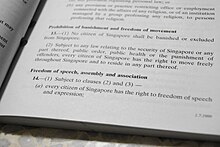
Article 14 of the Constitution of the Republic of Singapore, specifically Article 14(1), guarantees to Singapore citizens the rights to freedom of speech and expression, peaceful assembly without arms, and association. However, the enjoyment of these rights may be restricted by laws imposed by the Parliament of Singapore on the grounds stated in Article 14(2) of the Constitution.
There are two types of grounds. For the first type, it must be shown that restricting the rights is "necessary or expedient in the interest" of the grounds. The grounds are the security of Singapore and public order (applicable to all three rights protected by Article 14(1)), morality (freedom of speech and freedom of association), and friendly relations with other countries (freedom of speech only). In a 2005 judgment, the High Court expressed the view that the phrase necessary or expedient confers upon Parliament "an extremely wide discretionary power and remit that permits a multifarious and multifaceted approach towards achieving any of the purposes specified in Art 14(2) of the Constitution". It is unnecessary for the courts to determine whether a legislative restriction of a right is reasonable. All that is required is a nexus between the objective underlying the restrictive law and one of the grounds specified in Article 14(2) that Parliament is entitled to restrict the right on.
The right to free speech is limited on the ground of the security of Singapore by the Official Secrets Act (Cap. 213, 1985 Rev. Ed.), and on the ground of public order by the Broadcasting Act (Cap. 28, 2003 Rev. Ed.) and Newspaper and Printing Presses Act (Cap. 206, 2002 Rev. Ed.). Public order also justifies restrictions on both free speech and assembly imposed by the Sedition Act (Cap. 290, 1985 Rev. Ed.), Public Entertainments and Meetings Act (Cap. 257, 2001 Rev. Ed.) and Public Order Act (Cap. 257A, 2012 Rev. Ed.); and restrictions on the right to freedom of association imposed by the Societies Act (Cap. 311, 1985 Rev. Ed.). Freedom of speech has also been limited on the basis of morality by the Films Act (Cap. 107, 1998 Rev. Ed.), which establishes film censorship and classification regimes; and the Undesirable Publications Act (Cap. 338, 1998 Rev. Ed.), under which obscene or otherwise objectionable publications may be banned.
No necessity or expedience requirement applies to the second type of grounds, which appear in Articles 14(2)(a) (restrictions "designed to protect the privileges of Parliament or to provide against contempt of court, defamation or incitement to any offence") and 14(3) (laws relating to labour or education). At present, it appears that Parliament may restrict Article 14(1) rights on these grounds simply by enacting legislation, and that the courts are not entitled to assess if the restrictions are appropriate. The privileges of Parliament are set out in the Parliament (Privileges, Immunities and Powers) Act (Cap. 217, 2000 Rev. Ed.), and the Singapore courts have held that the common law offence of scandalizing the court (a form of contempt of court) does not violate Article 14(1)(a). The courts have also determined that the traditional common law rules of the tort of defamation strike a proper balance between free speech and the protection of reputation, and have declined to apply a public figure doctrine or responsible journalism as additional defences to the tort.
© MMXXIII Rich X Search. We shall prevail. All rights reserved. Rich X Search
